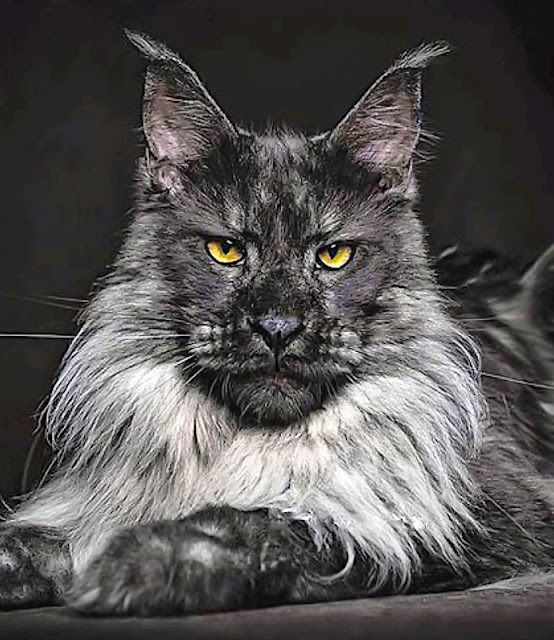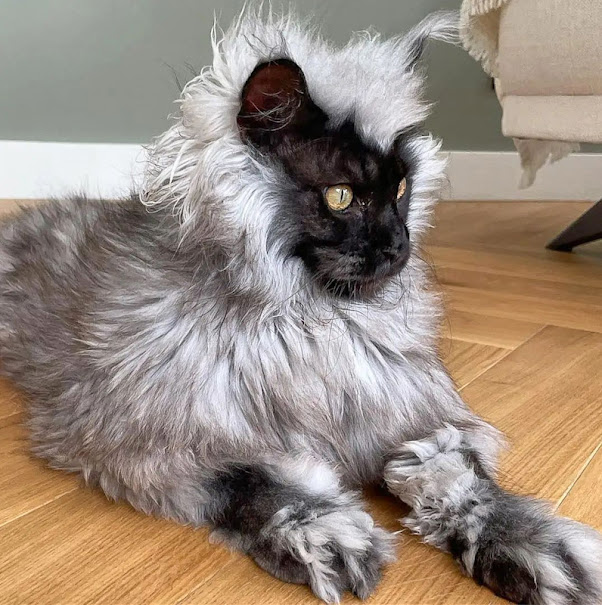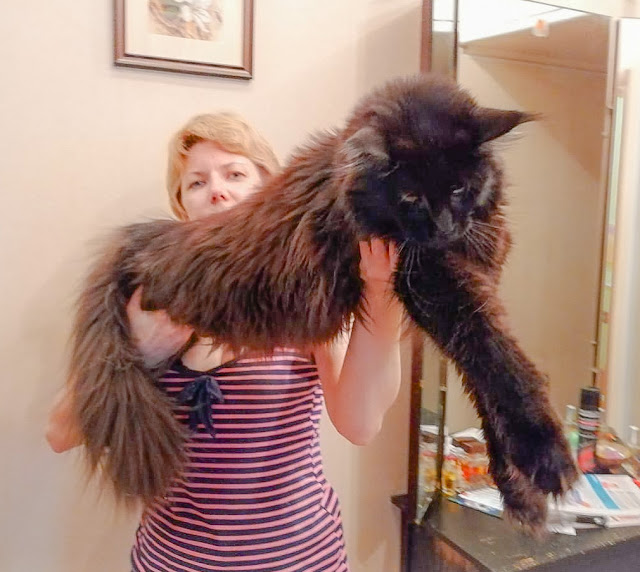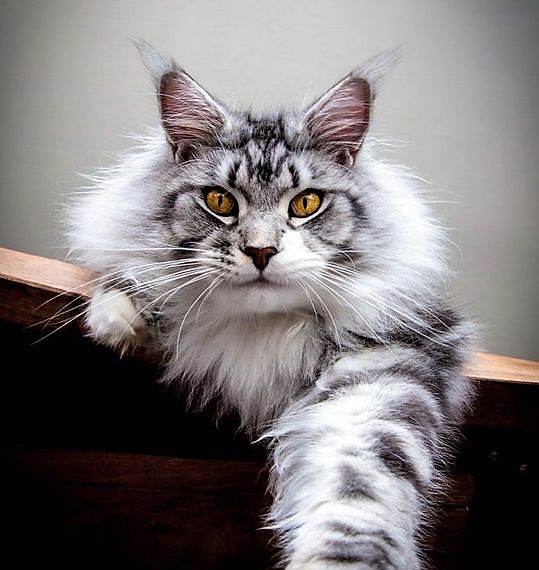Reasons Maine Coon breeder switched from raw to commercially manufactured wet and dry
I have just read an interesting blog article written by a Maine Coon breeder in the UK about feeding Maine Coon cats and indeed any domestic cat. Her experiences, of course, relate to Maine Coon cats. Her breeding cattery is called Rudycats Maine Coons Ltd.
 |
| One kitten from Rudycats Maine Coons Ltd. Image by them. |
I believe that it can be very useful to listen to cat breeders because they have more direct first-hand experience than most people in raising cats. And it is strongly in their interest to raise healthy cats. Their business is dependent upon it.
UPDATE: This breeder has been accused of being cruel and callous in her breeding. That is the allegation. It does not directly affect what she says about cat food, but you should know. Click this link to read about this allegation.
Therefore, they should be trying very hard and using their best efforts to create healthy and strong kittens. Nutrition is a major way to meet that goal.
I don't know the name of the breeder but perhaps it is unimportant. We just know that this person is a successful breeder of Maine Coon cats.
She was a strong advocate of raw cat food, so much so that she started a business supplying it to other breeders.
She found that Covid initially supported the quality of the meats supplied to her because the restaurant business had to close down during the Covid pandemic lockdowns. Meat suppliers supplied her and the pet food business.
The meat was of good quality but since people have got back to normal post Covid, demand for meat has increased to the point where some meat of suspect quality is being imported from abroad because in those countries (Eastern Europe and Poland I suspect) the standards are distinctly lower.
Some of this low-quality meat found its way to UK cat breeders making their own raw feed with resulting health issues in their kittens such as constipation and E. coli infections.
And in the UK raw cat meat suppliers are not regulated and controlled as they should be, she says. Their recipes are not approved by qualified veterinarians or nutritionists. She adds that supplements can be added without enough research or attention to the long-term effects.
And she further adds that the percentage of bone in the product varies per batch and sometimes with "fatal consequences especially in younger kittens".
RELATED: Cat Parasites – prevalence and species.
Transfer from raw to commercially prepared wet and dry cat foods
Because of the irregularity in quality in supplied raw cat meat they decided to close their raw meat business and transfer their cats to commercially prepared wet and dry.
She admits that it appears that breeders are in two camps: those who are pro-raw meat who think that commercially prepared cat food is of universally of very poor quality and those who use commercially prepared cat food.
She converted to conventional, pet food manufactured wet and dry cat foods. She found that her cats transferred to these foods easily from raw whereas going in the opposite direction was much harder.
With respect to the labelling of wet and dry commercially manufactured cat foods she says that you should ignore the ingredients as they do not equal the quality of nutrients. It is much better to look at nutrients.
On her research she says that:
"On an elemental level, amino acids, fatty acids, and carbohydrates, along with minerals, are what the cat's body runs on. This is what matters."
And, as an example, she refers to corn gluten meal which is a good source of protein. It is not a 'filler'. Obviously, nuggets of corn are indigestible to a cat but when it is broken down to corn gluten, which is the protein part, it is digestible and a "great source of protein and amino acids which cats need".
And don't be fooled by what she calls catchphrases such as "whole foods", "natural protein" and "no fillers". This is not mean that the food is high quality. It is a marketing ploy.
Before she switched from raw cat food to commercially prepared cat food she weighed her cats and took photos of her cats' teeth and coat condition. And she says that "every single one of my cats has improved dental condition".
Smelly poo
A lot of people, and I have seen this on the Internet, state that a raw diet helps to eliminate smelly poo and diarrhoea. This applies particularly to Bengal cats I have read.
But this breeder says that smelly poo is not caused by the diet necessarily but by a tiny gut parasite called Giardia which is fairly common. A raw diet helps to suppress its effect resulting in less smelly poo.
However, it isn't the food per se which causes smelly poo, and, in any case, Giardia can be treated quite easily with a drug caused Panacur which can be purchased without a prescription in any pet shop including, in the UK, Pets at Home.
"Fenbendazole (brand names Panacur®, Safe-Guard®) is a medication used to treat a variety of parasites (e.g., roundworms, hookworms, lungworm, whipworm, and certain types of tapeworms) in dogs." - VCA Hospitals.She says that a five-day course will cure most cats, but they might need a second five-day course and (rarely) antibiotics for a week, but overall giardia is not difficult to resolve.
Conclusion?
My conclusion from reading her interesting article is that when veterinarians say that cat owners should not dip into making their own raw cat food because of the inherent dangers of it including contamination by bacteria and handling and storage difficulties, they are at least potentially correct. It does depend upon the person and how skilled they are and on the quality of supplied raw meats clearly based upon this article.
But perhaps it is important to keep an open mind about commercially prepared cat food but always aim for the highest possible quality and wet cat food should be the default food as it's more natural containing, as it does, and amount of moisture or water which is equivalent to that found in a mouse. Dry cat food is unnatural and therefore a cat needs to drink more water, but they are bad drinkers of water because of their wildcat inheritance.










Are you aware of the site that has been documenting the acts of animal cruelty committed by Rudycats, including Rudycats euthanising kittens via smothering and admitting to "forgetting" to feed emaciated, dying kittens?
ReplyDeletehttps://rudyexposed.wordpress.com/
This comment has been removed by the author.
DeleteWell I have written a first page on this story. Many thanks for the great work. https://maine-coon.pictures-of-cats.org/2022/11/rudycats-accused-of-being-heartless-and.html
Delete